10 Amazing Alcohol-Free (0.0) Drinks to Power Your Triathlon Training in Sunny Spain!
 Karen Parnell
July 18, 2023
Karen Parnell
July 18, 2023
10 Amazing Alcohol-Free (0.0) Drinks to Power Your Triathlon Training in Sunny Spain!
Many athletes travel to Spain for training or summer holidays every year so I thought I would compile a list of alcohol-free drinks you can enjoy when here.
As you know alcohol can severely impact your training and racing but sometimes when the sun is out it’s nice to unwind with a cool beer. Whilst beer containing alcohol can dull your athletic performance, alcohol free beer can enhance it. One Study by the Université de Lausanne found non-alcoholic beer before exercise could help maintain electrolyte homeostasis during exercise.
According to Johannes Scherr, the head of the University Centre for Prevention and Sports Medicine at the University of Zurich, non-alcoholic beer can serve as an effective beverage for rehydration due to its non-diuretic properties (standard beer is a diuretic). In a 2016 study, athletes who consumed non-alcoholic beer 45 minutes before a vigorous and sweat-inducing workout achieved a post-workout hydration level comparable to those who consumed water prior to the exercise. However, the non-alcoholic beer drinkers retained higher levels of sodium and potassium in their bodies, essential minerals for optimal performance and endurance. In essence, non-alcoholic beer can be considered a viable option for replenishing fluids after physical exertion, making it a reasonable choice as a recovery drink.
Another study found that when athletes consistently drank non-alcoholic beer, markers of inflammation like white blood cell activity were down by 20% and there was a lower frequency of infection (along with milder symptoms). Getting an illness during training is not fun for any athlete so anything that helps avoid sickness has to be good?
In this blog I have chosen the best alcohol-free lagers, dark beers, and stouts I have found here in Spain so you can enjoy a cerveza with your friends and family.
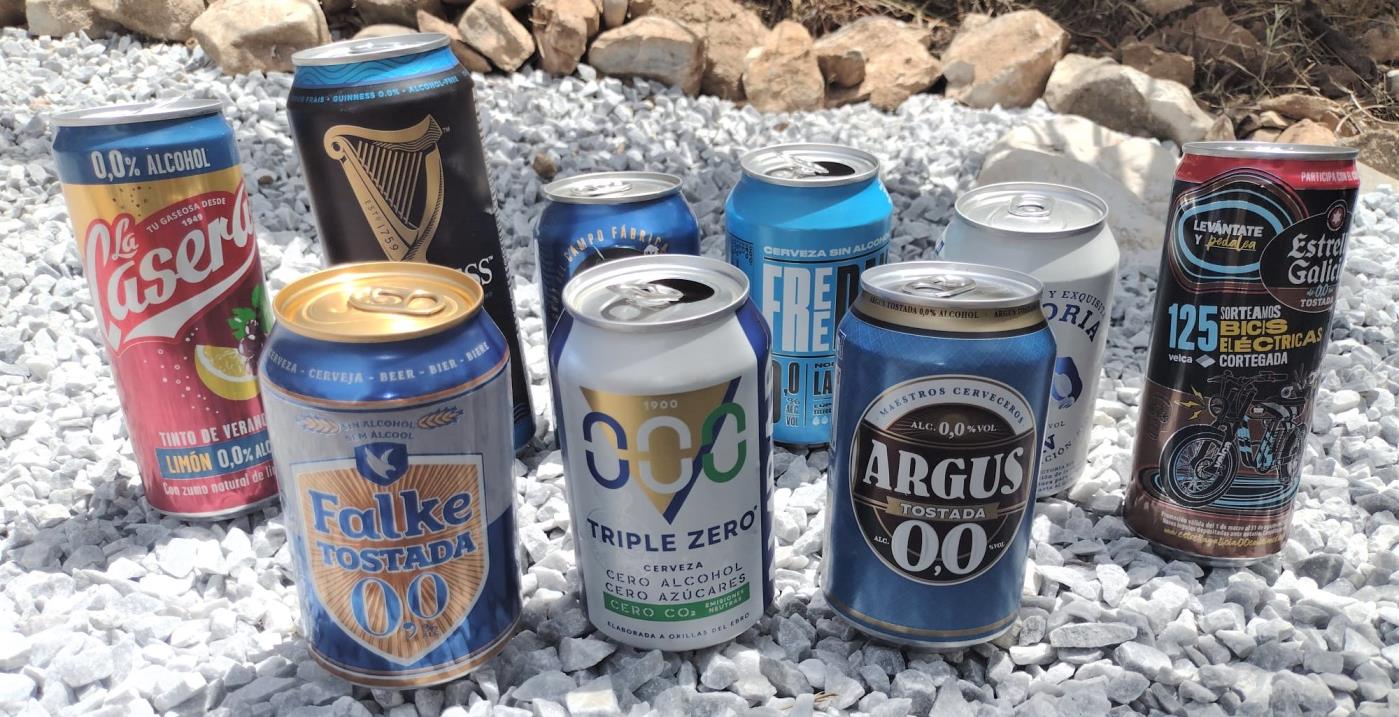
The non alcoholic beers I tested
Get your FREE Athlete Recipe Books
Alcohol Free Beer in Spain
Alcohol free beer in Spain is extremely popular and served in almost all bars but you need to know what you are asking for as it may be in the fridge and not on display. The alcohol-free beers tend to come in blue cans or bottles and have “0.0” written on them. They do also have low alcohol beers with around 0.2 to 0.5% alcohol and these are designated “sin” or “without” beer but have no “0.0” on the label.
The standard alcohol free beers tend to be blonde or lager type beers and if you ask for “una cerveza cero cero por favor” you will get a standard alcohol free beer. If you would like a darker alcohol-free beer then ask for “una cerveza tostada por favor” which literally mean toasted beer. If they reply “La cerveza es sin alcohol” you know it may contain a little alcohol.
If on the other hand you would like a shandy you can ask for a “clara”. Another lower alcohol drink is half wine and half lemonade which is called “tinto de Verano” for the red variant and “blanco de verano” and is know as the wine of the summer. Another alternative is Radler which is a fusion of beer and lemon (or other juice like apple) and now even comes in a 0.0 version.
1. Blonde or Lager Beers 0.0
These beers are based on lager or blonde beers and are quite fizzy but lower in calories than the darker beers. This makes them very easy to drink and in keeping with a very sunny holiday.
Victoria 0.0
20 kcal per 100ml
Sugar 1.7g per 100ml
Salt <0.01g per 100ml
Protein 0.2g
I thought it was appropriate to start with the beer of Malaga – Victoria. It has been a favourite of ours since we moved to the Malaga region. It’s widely available around the Malaga region and the Costa del Sol and has is a very refreshing beer and ideal for after a long training session.

Victoria 0.0 beer from Malaga
San Miquel 0.0
24 kcal per 100ml
Sugar 1.7g per 100ml
Salt 0.01g per 100ml
Protein 0.3g
This is probably the most well know of the Spanish beers and they have produced a good 0.0 version of their beers.
Mahou San Miguel is probably the most well known Spanish brewing company and was founded in Madrid in 1890 under the name of Hijos de Casimiro Mahou, fábrica de hielo y cerveza (English: The Sons of Casimiro Mahou, production of ice and beer). Mahou San Miguel is the leading brand in the Spanish beer market so if you ask for a 0.0 beer you may get this one. It’s a lager/blonde beer which is refreshing but don’t expect it to take very like the alcoholic version.
This is also available as a 0.0 Radler beer plus a Mahou and San Miguel Magna tostada 0.0 but I have not yet tried these but I intend to soon.
They have a cool service on their website where you can find out which bars sell it where you are in Spain.
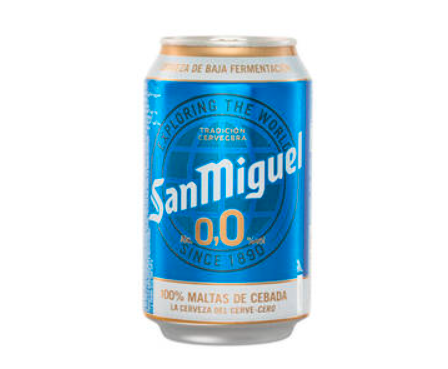
Cruzcampo 0.0
22 kcal per 100ml
Sugar 2g per 100ml
Salt <0.01g per 100ml
Protein 0g
Cruzcampo is another Spanish brand and hails from Andalusia and is brewed in Seville, Madrid, Valencia, Jaén and Arano. This is a great beer and can be cheaper than others and the 0.0 version is a little sweeter than others. If this turns up when you order a 0.0 beer I’m sure you will enjoy it.
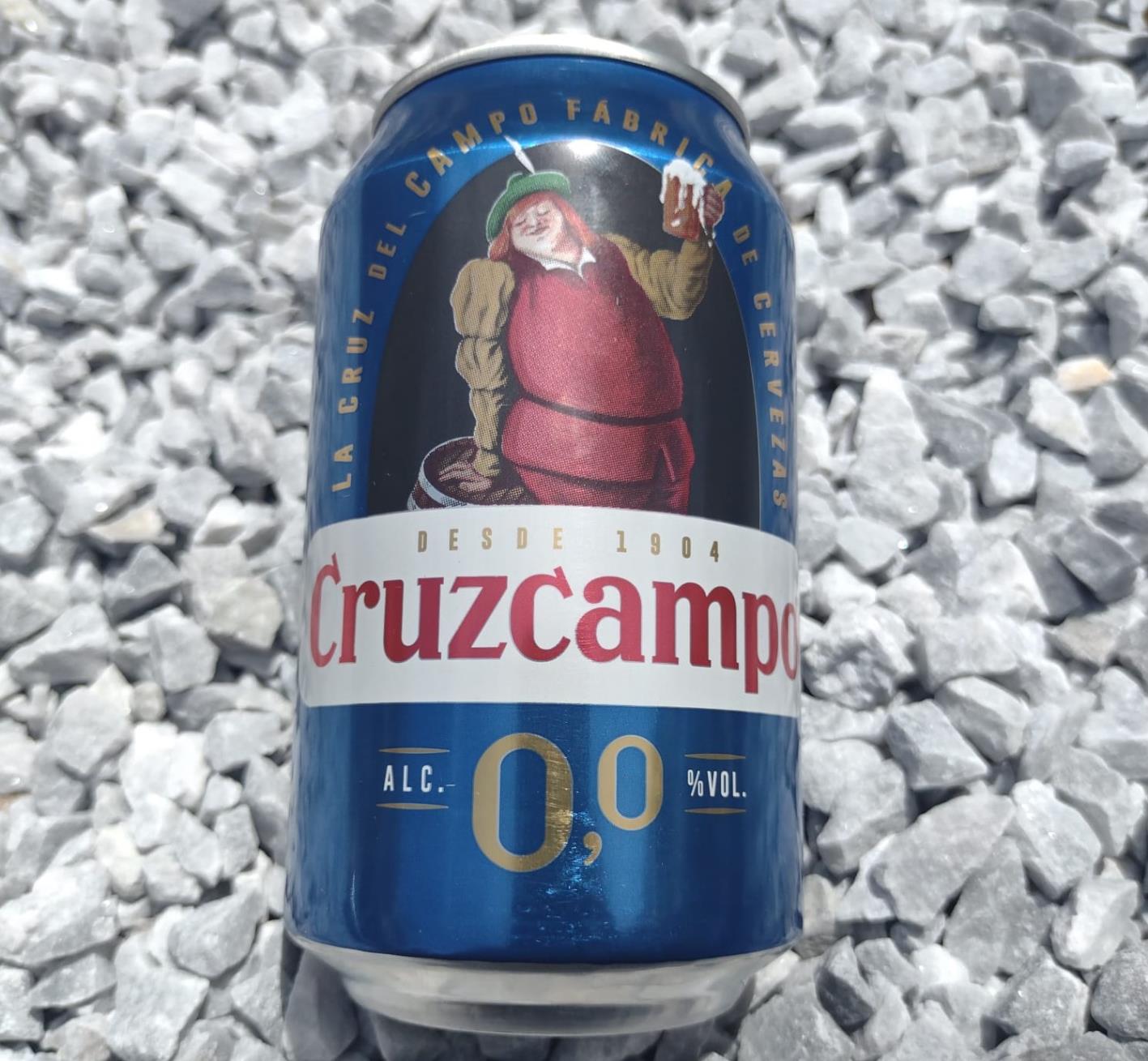
Cruzcampo 0.0 beer from Andalucia
Free Damm 0.0
20 kcal per 100ml
Sugar 1.7g per 100ml
Salt <0.01g per 100ml
Protein 0.2g
Free Damm is brewed by the Estrella Damm Brewery in Barcelona, Spain but you may have seen it where you live. For me this is the one that tastes most like lager and my favourite. They also produce a tostada version, but I have yet to find it but definitely want to give it a try. You probably won’t get this in many bars, but you can seek it out and find it in supermarkets.
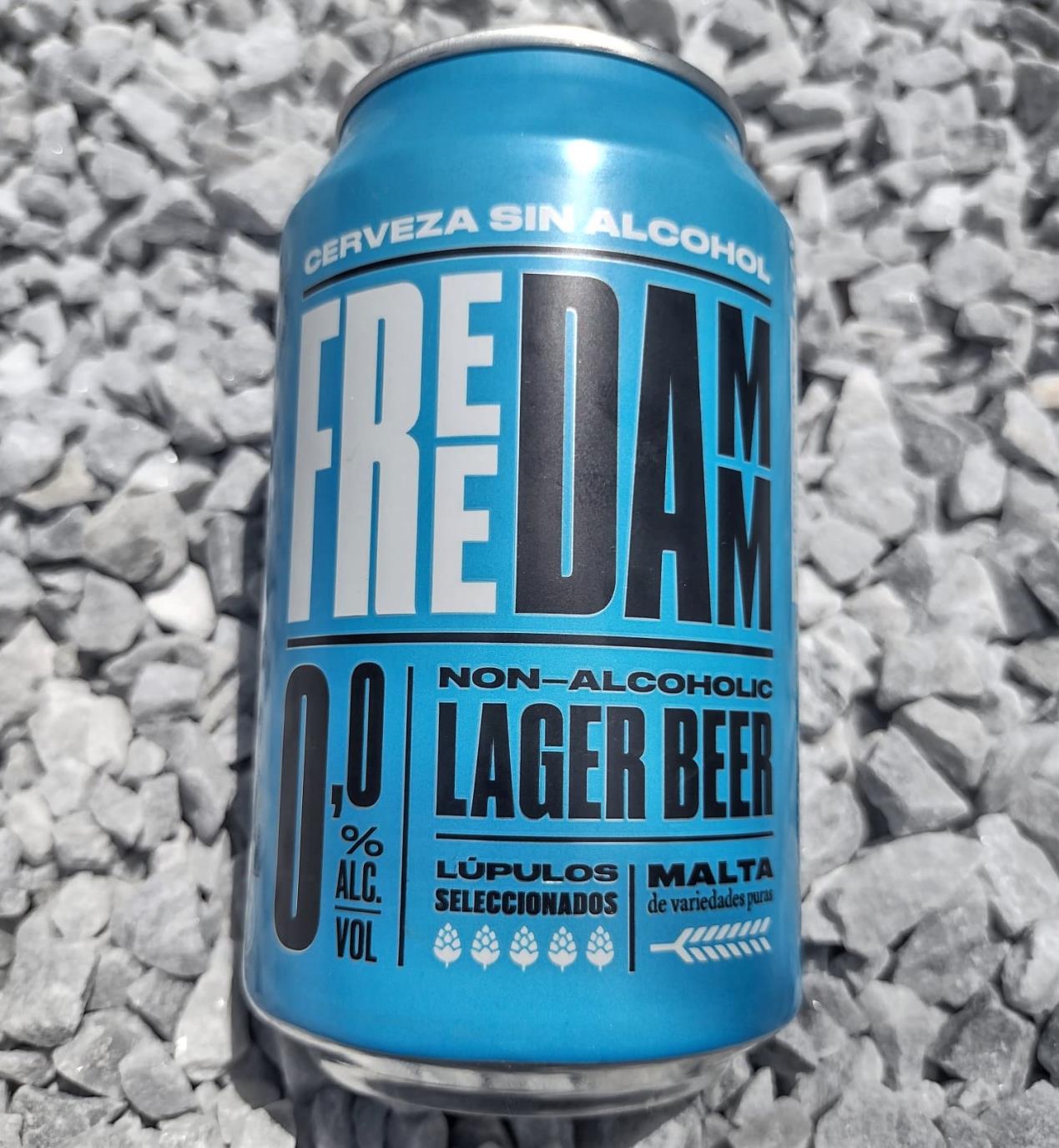
Free Damm 0.0 beer brewed in Barcelona
Ambar 0.0.0
18 kcal per 100ml
Sugar 0g per 100ml
Salt 0g per 100ml
Protein 0g
This beer has an extra zero in the title, and this is because it has zero alcohol, zero sugar and zero CO2 so is carbon neutral. It does not list any artificial sweeteners which is also good. The calories per 100ml is not as low as I expected but the taste is great.
It’s made in Spain in Zaragoza so is available all over Spain. This one is the one for you if you want to look after your body and the planet.
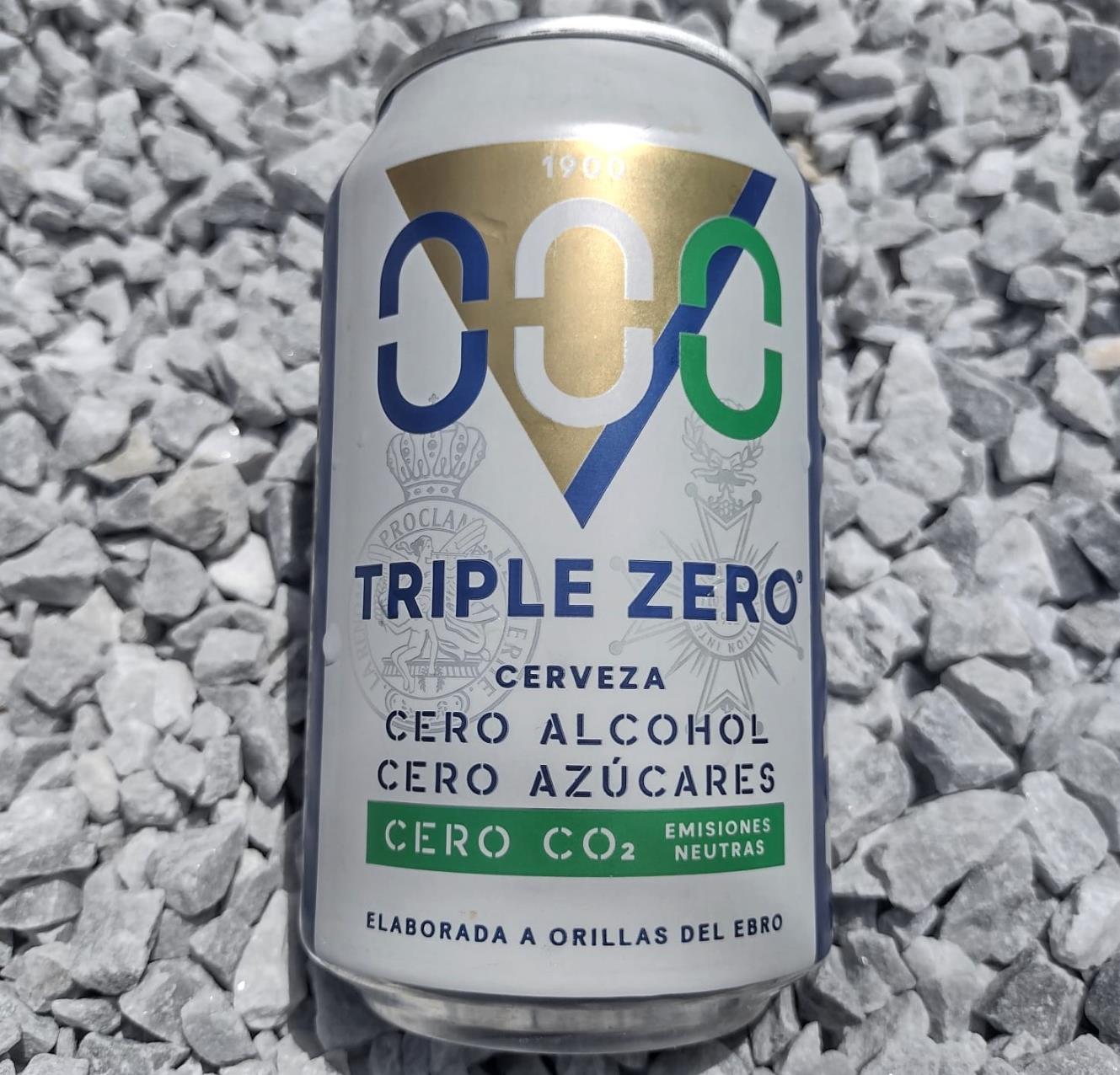
Ambar 0.0.0 beer from Zaragoza
2. Tostada or Brown Beers 0.0
We will now take a look at the tostada beers which are darker than larger and tend to have more flavour and a touch more sugar than the lager style alcohol free beers. Don’t worry they are still refreshing!
Falke Tostada 0.0
25 kcal per 100ml
Sugar 2.3g per 100ml
Salt <0.01g per 100ml
Protein 1.3g
You can get this beer in the Mercadona supermarket in Spain and is my favourite due to its smoothness and slightly sweet taste. It’s brewed for Mercadona by Heineken Spain, so you know it has a good pedigree. Again not served in bars but you can get them for a very good price in Aldi.
This beer is has slightly more calories and also more protein which may be good after a training session?
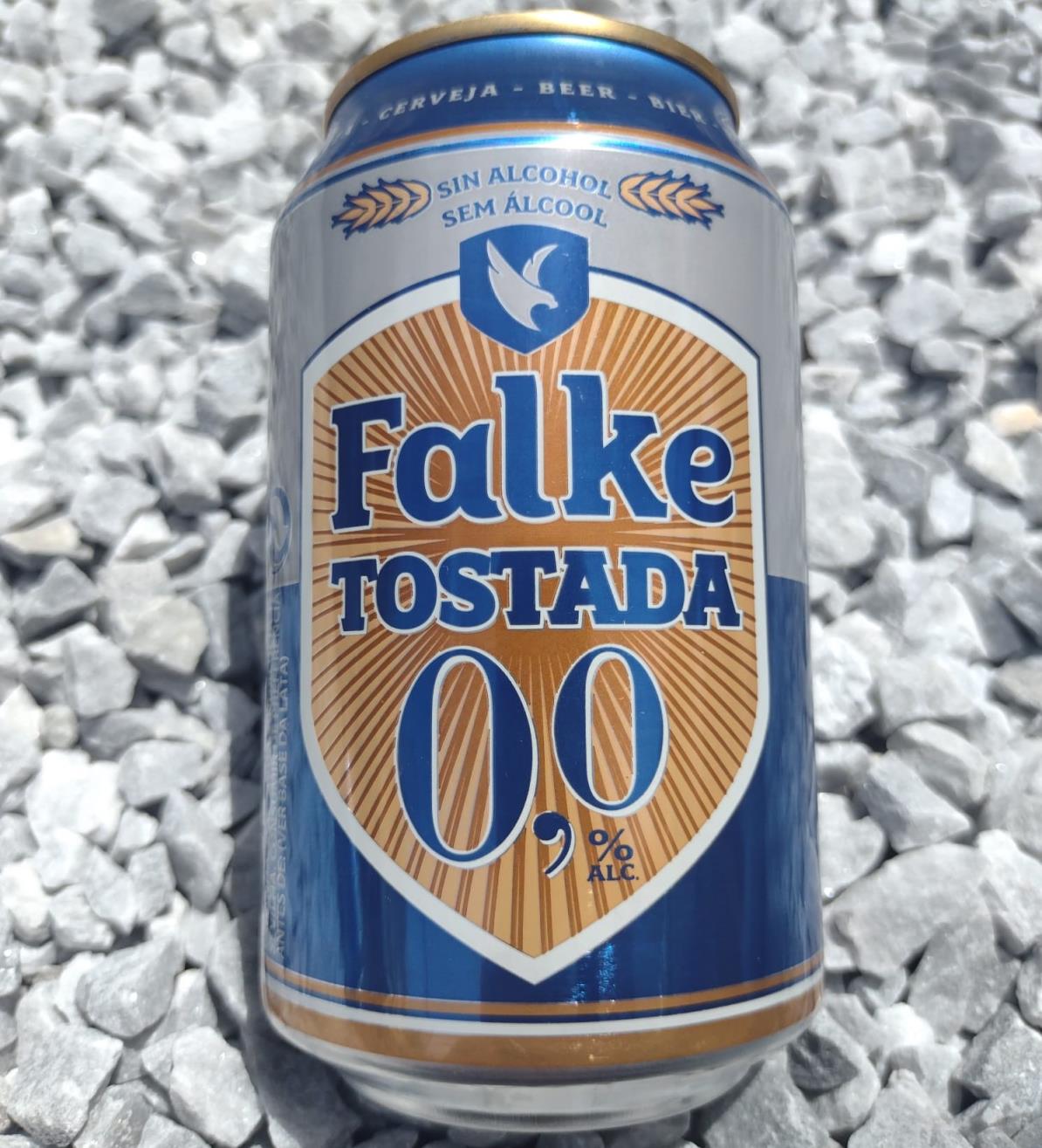
Falke Tostada 0.0 beer brewed by Heineken in Spain
Argus Tostada 0.0
24 kcal per 100ml
Sugar 3.2g per 100ml
Salt 0.01g per 100ml
Protein 0.2g
This is the found in the aisles of Lidl and is brewed in Valencia by Font Salem of the Damm Group (Estrella Damm, Bock, Xibeca, Voll Damm, etc.). This has the most sugar in but not the same level of protein as the Aldi version. This extra sugar does give it a sweet taste and for the price is a good way to enjoy 0.0 beer in Spain.
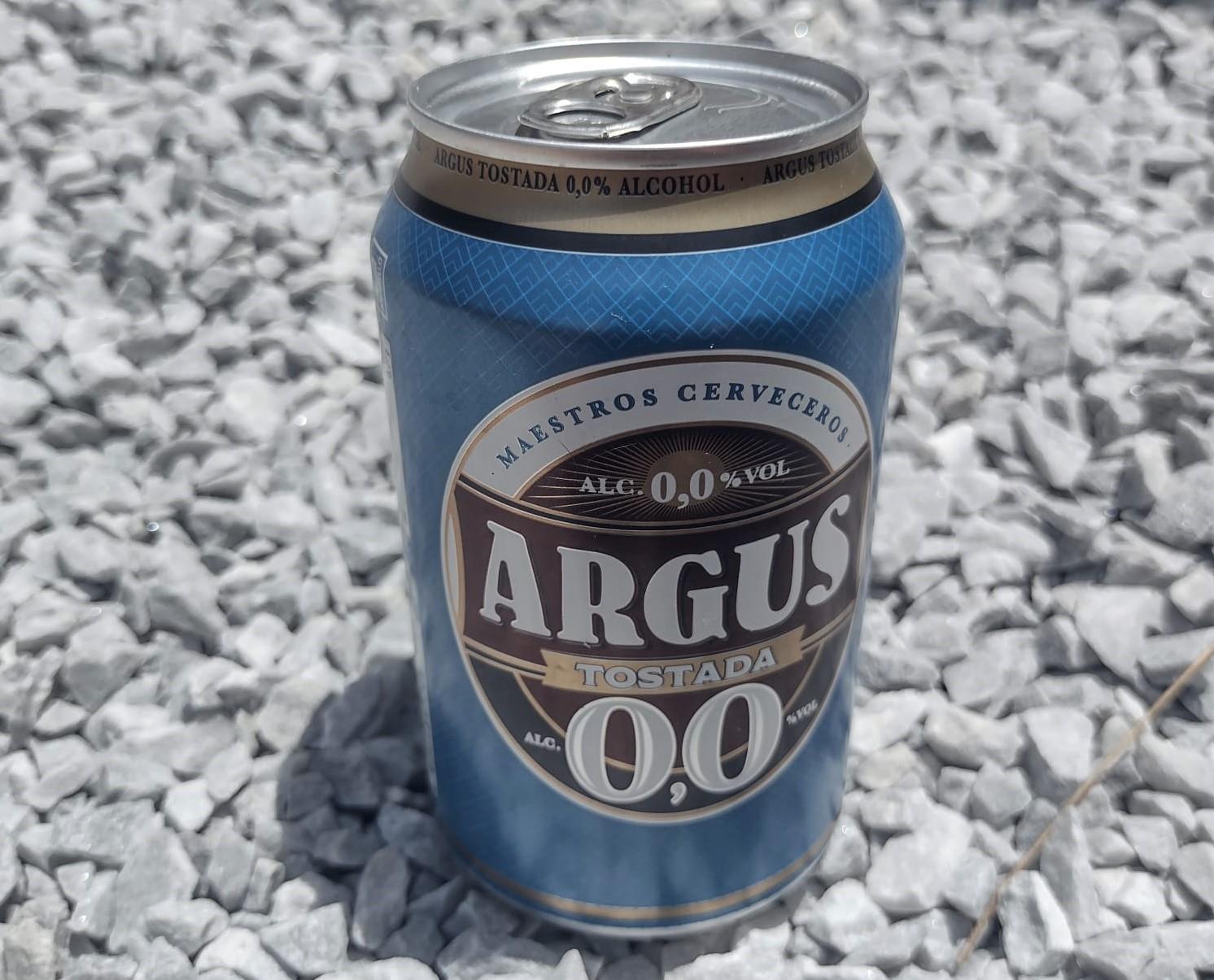
Argus Tostada 0.0 beer brewed in Valencia
Estrella Gallicia Tostada 0.0
24 kcal per 100ml
Sugar 2.1g per 100ml
Salt 0g per 100ml
Protein 0g
Estrella Galicia is a brand of pale lager beer, manufactured by the company Hijos de Rivera Brewery, and located in A Coruña, Galicia, Spain. The Estrella Galicia brewery was founded in 1906 by José María Rivera Corral when he returned to Galicia after travels in Cuba and Mexico. This beer is served in bars throughout Spain so no need to visit the supermarket to sample it. It’s one of my favourites and I’m always pleased to see it when I get served it in a bar.
I intend to find the San Miguel Magna tostada, Mahou tostada and Free Damm tostada and update this blog soon.
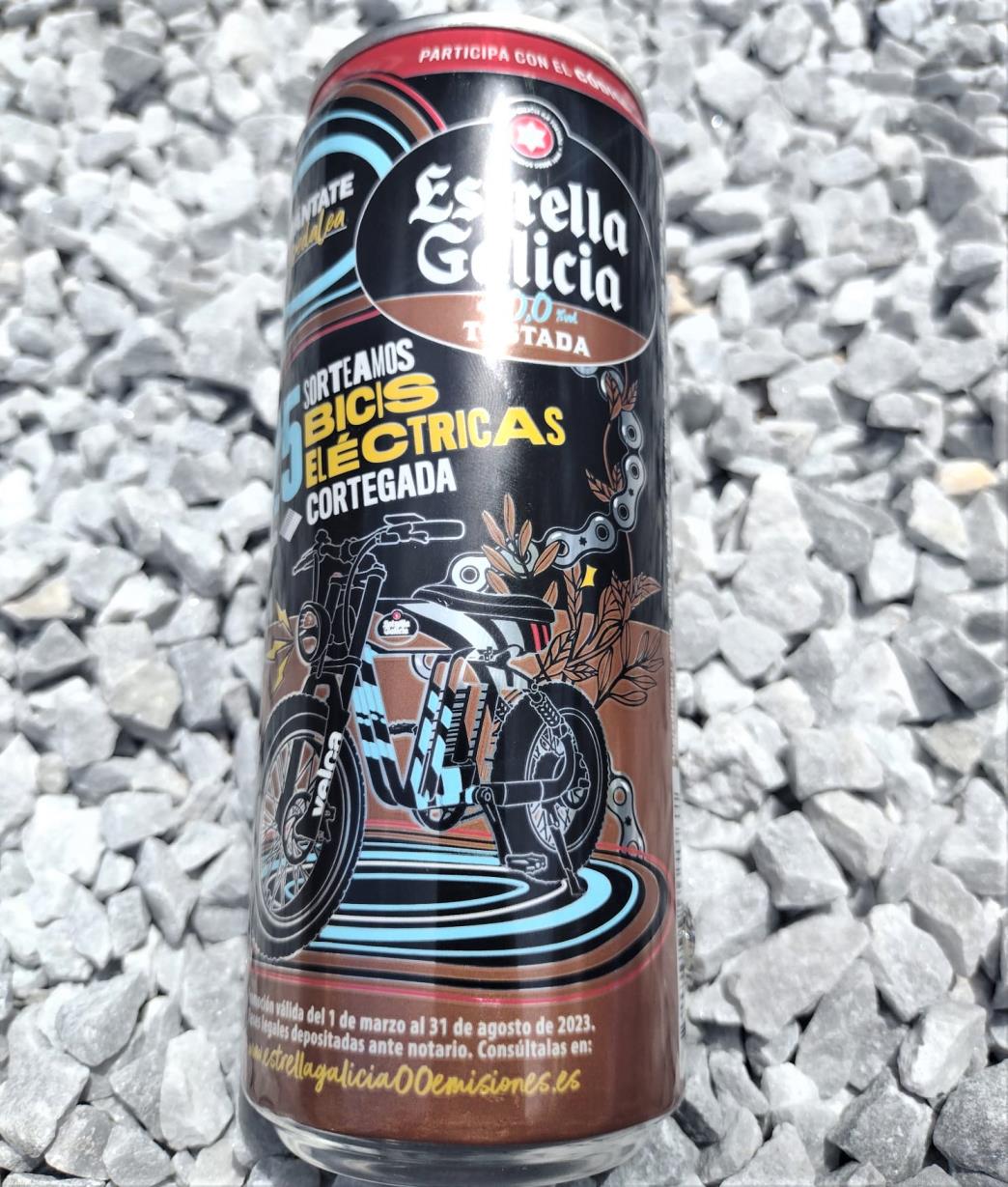
Estrella Galicia Tostada 0.0 beer from Galicia
3. Stout 0.0
If you like a really dark beer you can still find some 0.0 versions but here in Spain, I could only find one but it’s a good one!
Guinness 0.0
17 kcal per 100ml
Sugar 0g per 100ml
Salt 0.7g per 100ml
Protein 0g
I have only found one 0.0 stout in Spain and it’s Guinness and boy is it good! If you poured one for someone and did not tell them it was 0.0 I doubt they would be able to tell. It pours the same as it’s alcoholic brother and looks the same in the glass with a thick creamy head.
It’s also one of the lower calorie 0.0 beers so it can do no wrong! I appreciate it is not Spanish and this is the only stout I have found so it does win the best stout category but for me it almost won the best overall 0.0 beer.
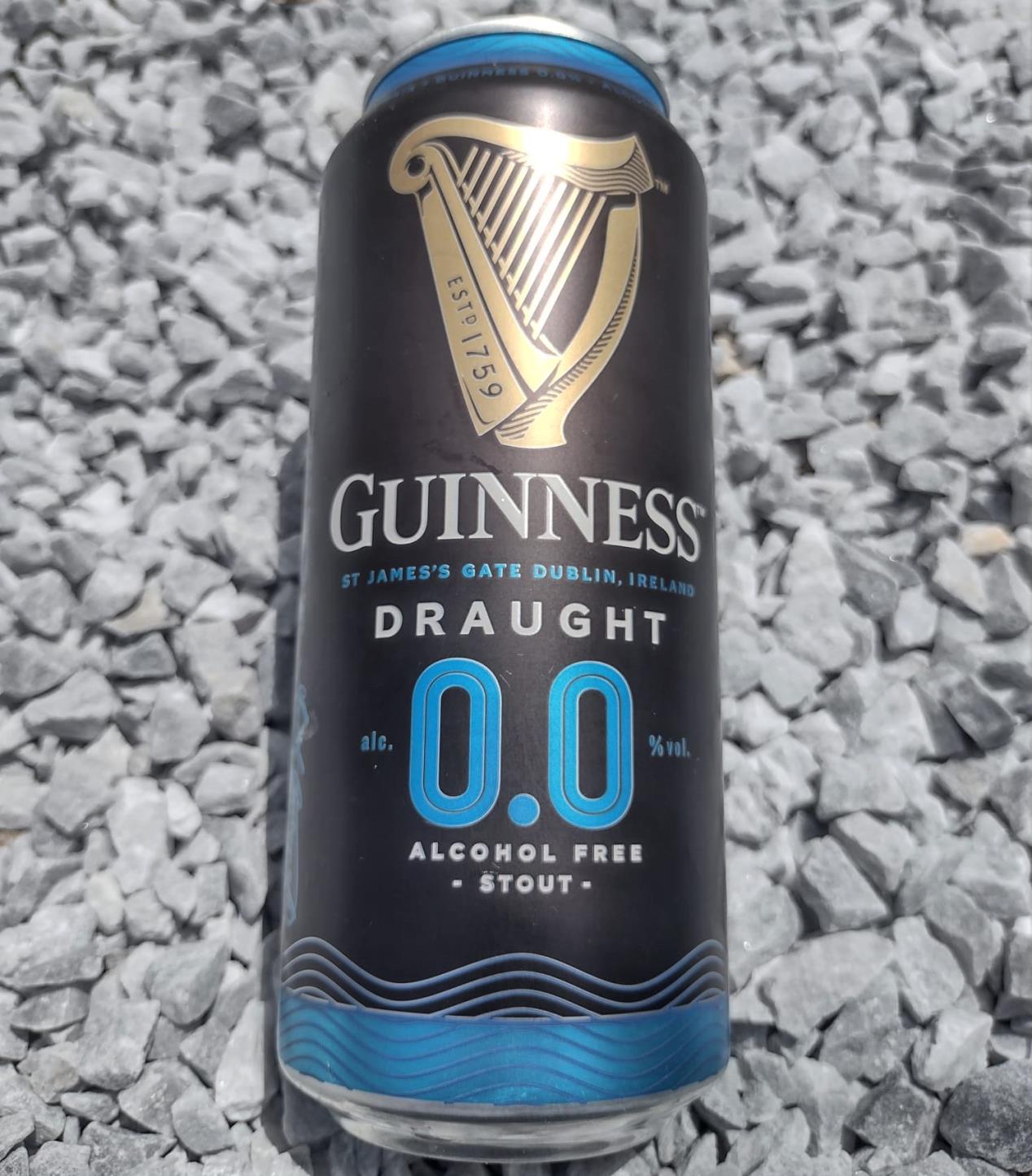
Guinness 0.0 Stout brewed in Ireland
4. IPA (India Pal Ale) 0.0
I love a good hoppy, zesty IPA and this Blog would not be complete without a non-alcoholic version of this popular drink. It did however prove to be difficult for me to find one in Spain which is readily available. My search lead me to Zeta Be Low which I had to order online.
Zeta Be Low IPA 0.0
23 kcal per 100ml
Sugar 3.2g per 100ml
Salt 0g per 100ml
Protein 0.1g
I didn't know what to expect when I tried this IPA 0.0 as I do love IPA beers and wanted it to be good as well as "be low". Immediately after opening the bottle I could smell mango and grapefruit so was hopefully. It poured well with a light brown colour and just the right amount of foamy head. The taste did not disappoint and has knocked Guinness off the top spot!
Zeta beer is brewed in Alboraia, Valencia in Spain
If you get a chance seek out an IPA 0.0 and let me know if you have the same experience - I hope you do!
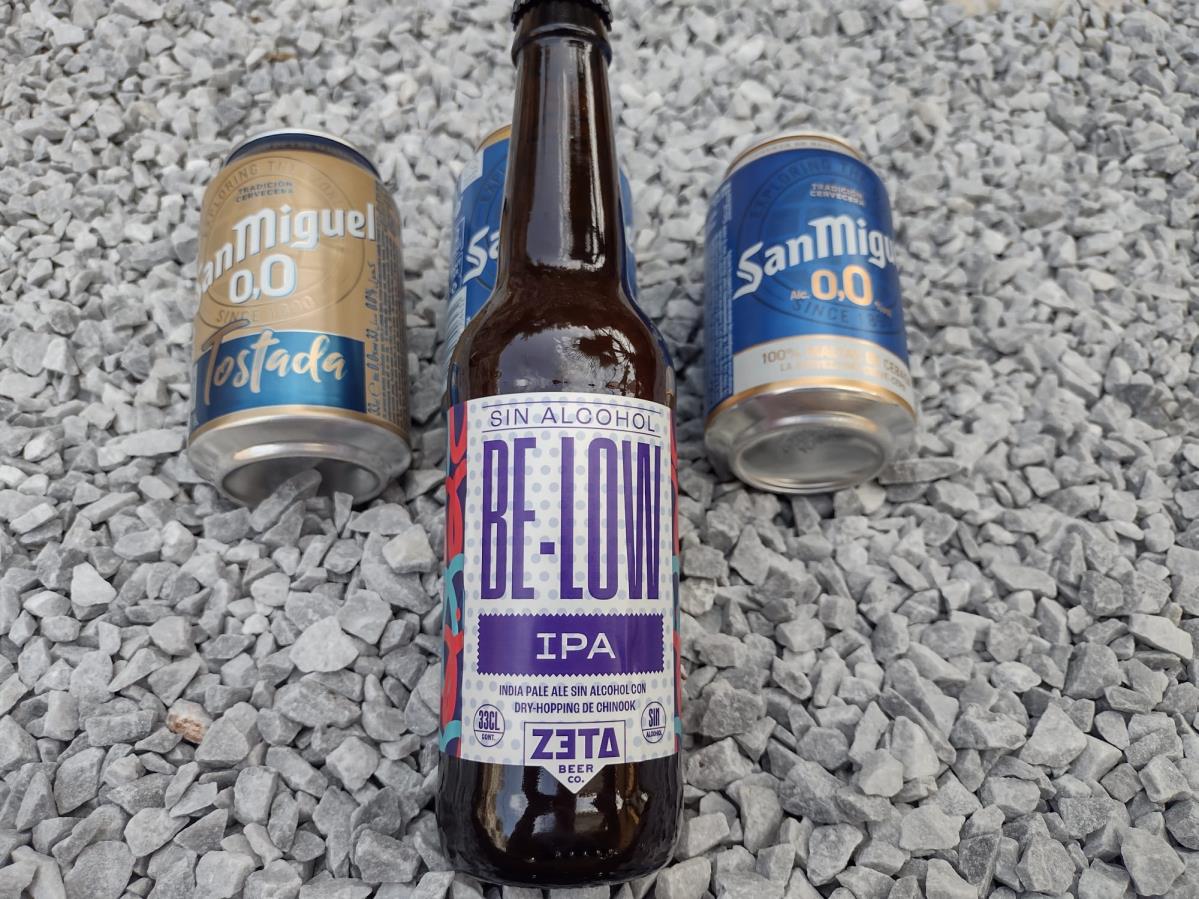
Be Low IPA O.O beer the best on test
Tinto de Verano and Radler 0.0
We discussed tinto de Verano (summer wine which is a mixture of red wine and lemonade or gaseosa) and Radler (beer and lemon) and both of these come in 0.0 form.
They can contain sweeteners like Aspartame so it’s worth reading the labels if you are trying to avoid this. They can sometimes list sweeteners as just E-numbers so if you are avoiding them here’s a quick look up table:

Table: E Numbers for artificial sweeteners
You can find more details on the Food Standards Agency website.
Tinto de Verano Casera 0.0
18 kcal per 100ml
Sugar 3.8g per 100ml
Salt 0.1g per 100ml
Protein 0.1g
This is an alcohol-free version of Tinto de Verano and is incredibly sweet. Unlike the 0.0 beers it does not appear to have alcohol free red wine but with grape juice. It has a high sugar and salt content so if you are avoiding this then give this drink a miss.
I found this drink so sweet it was not refreshing and does not taste like tinto de Verano made with red wine and gaseosa.
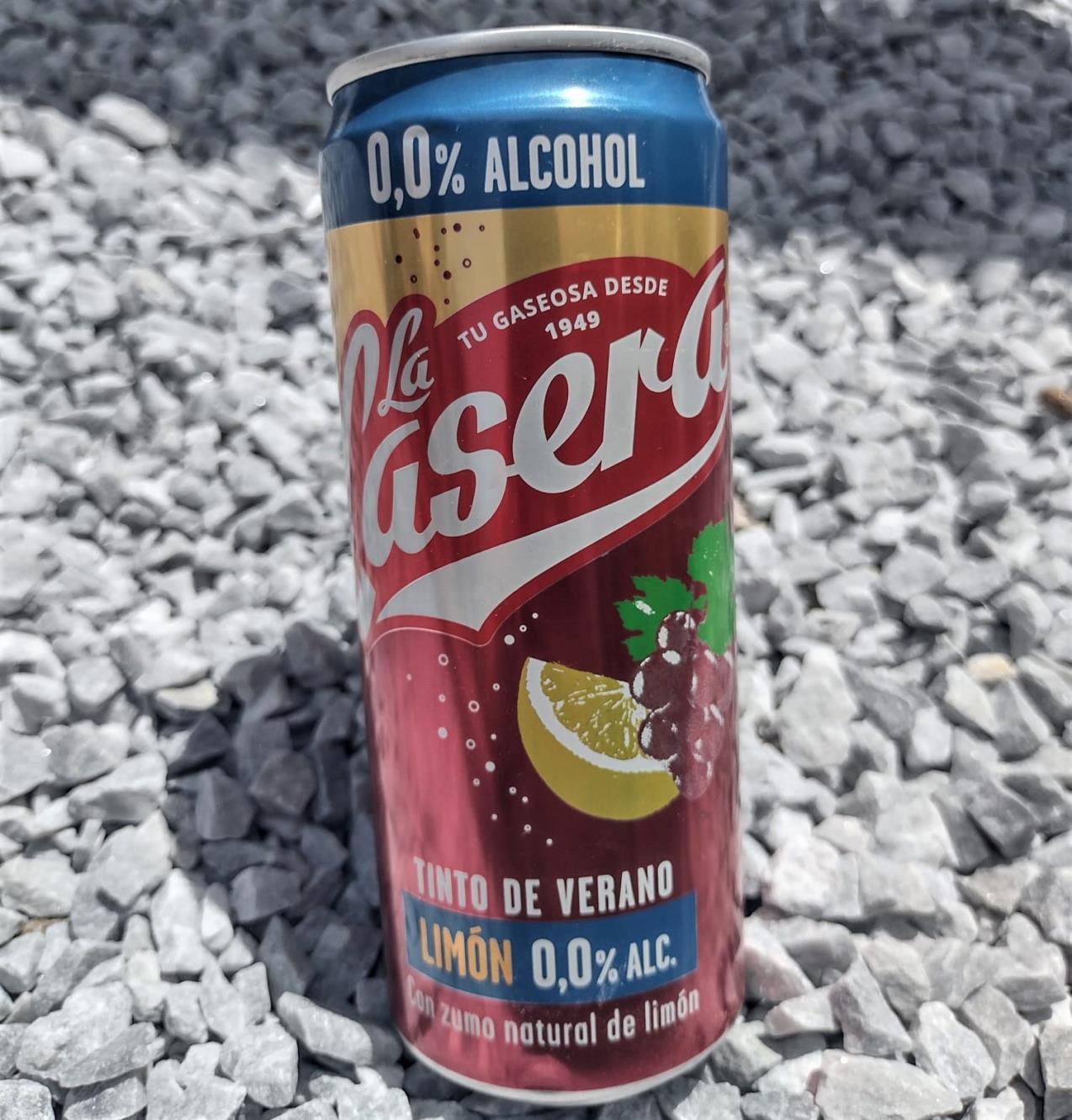
Casera Tinto de Verano 0.0
San Miguel Radler Limon 0.0
37 kcal per 100ml
Sugar 6.3g per 100ml
Salt 0g per 100ml
Protein 0.2g
Radler is a combination of beer and fruit juice and San Miguel do two variants of 0.0 Radler, one is lemon and the other apple. Again, this has quite a lot of sugar so is a sweet drink but on the plus side does include natural lemon juice.
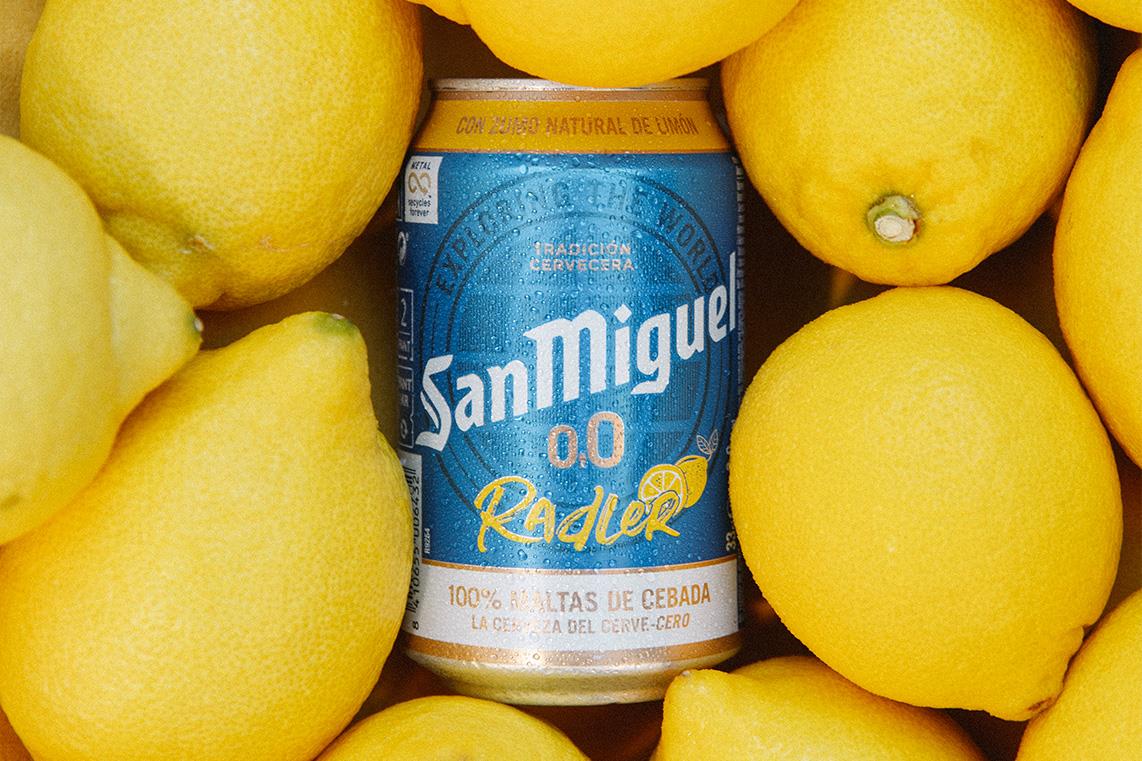
San Miguel Radler 0.0 made with real lemon juice
Post Race Bubbly: Freixenet 0.0 Cava
If you prefer to celebrate your race with a glass of bubbly but don't want the alcohol then this Cava from Freixenet is worth seeking out. It is a 0.0% sparkling wine and also low calorie. I found it a bit sweet to begin with but the second glass was much better!
Freixenet Cava Sparkling Wine 0.0
19 kcal per 100ml
Sugar 3.8g per 100ml
Salt 0.01g per 100ml
Protein 0g
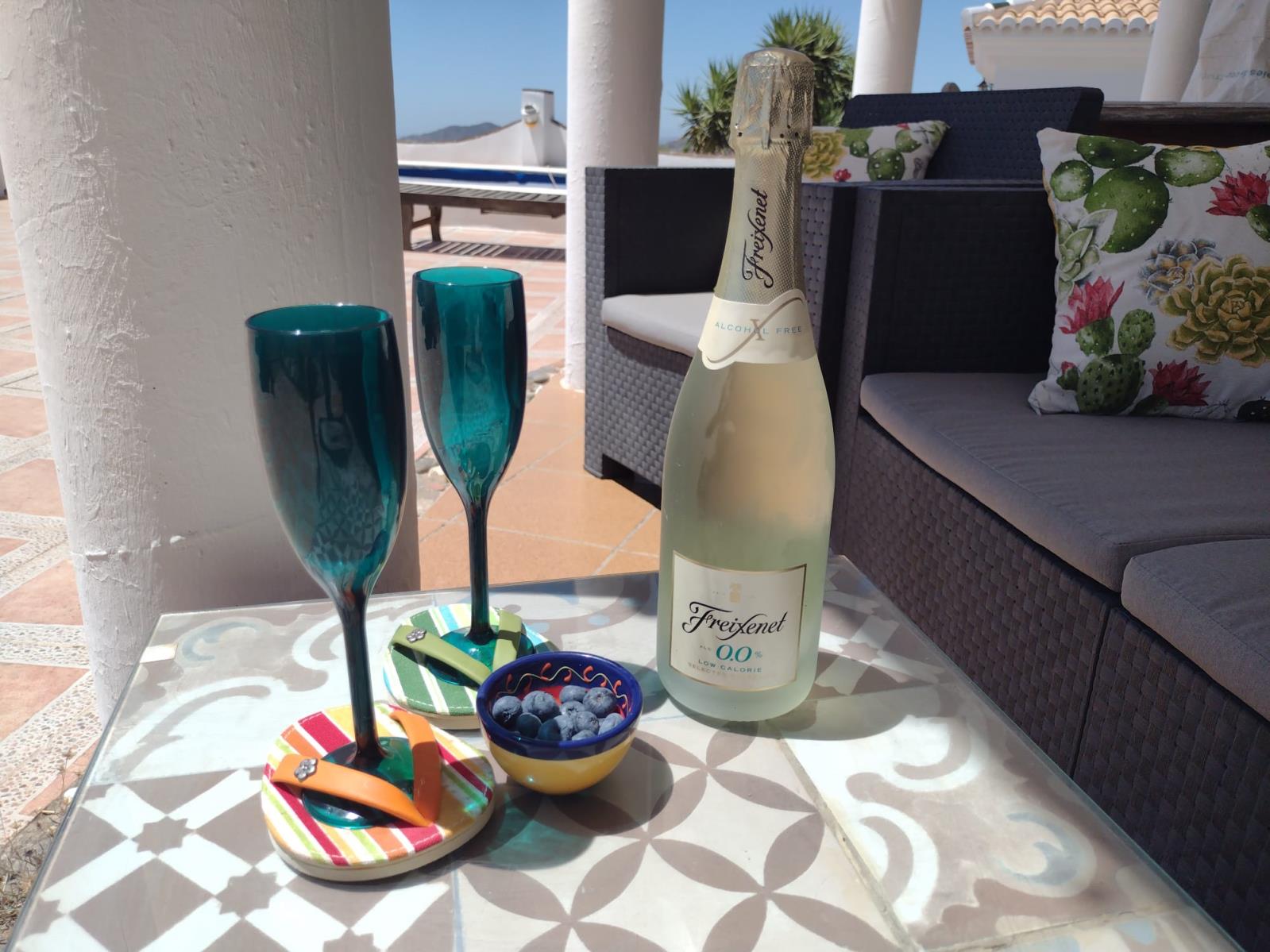
Freixenet 0.0% low calories Cava sparkling wine
Conclusion: Why Drink 0.0 or Alchohol Free Drinks
I have tried many 0.0 drinks in my quest to find the best one in each category. The best lager/blonde beer has to be Free Damm as it tastes the most like lager and is super refreshing. For the tostada/dark beer then for me Falke tostada 0.0 from Aldi wins with it’s smooth and slightly sweet taste. The best stout and also almost the best beer 0.0 beer overall is Guinness 0.0. The best IPA 0.0 award goes to Be low IPA 0.0 and is my top pick.
You may not be able to get all of these in every bar but if you say the words ““una cerveza cero cero por favor” you are bound to get a refreshing beer you can drink after a hot, sweaty workout or just chilling by the beach.
If you prefer bubby to celebrate a race then Freixenent is a great refreshing 0.0 choice.
Karen Parnell is a Level 3 British Triathlon and IRONMAN Certified Coach, 8020 Endurance Certified Coach, WOWSA Level 3 open water swimming coach and NASM Personal Trainer and Sports Technology Writer.
Karen has recently completed a postgraduate MSc in Sports Performance Coaching at the University of Stirling.
Need a training plan? I have plans on TrainingPeaks and FinalSurge:
I also coach a very small number of athletes one to one for all triathlon and multi-sport distances, open water swimming events and running races, email me for details and availability. Karen.parnell@chilitri.com
Get your FREE Guide to Running Speed and Technique
Get your FREE Swim Workouts for Triathletes E-book
Get your FREE Open Water Swimming Sessions E-Book
Get your FREE 31 Structures Indoor Cycling Training Sessions and Training Plan
References
STUDY SHOWS PERFECT SPORTS RECOVERY DRINK IS… NON-ALCOHOLIC BEER – GRAN FONDO DAILY NEWS
Nonalcoholic beer reduces inflammation and incidence of respiratory tract illness - PubMed (nih.gov)
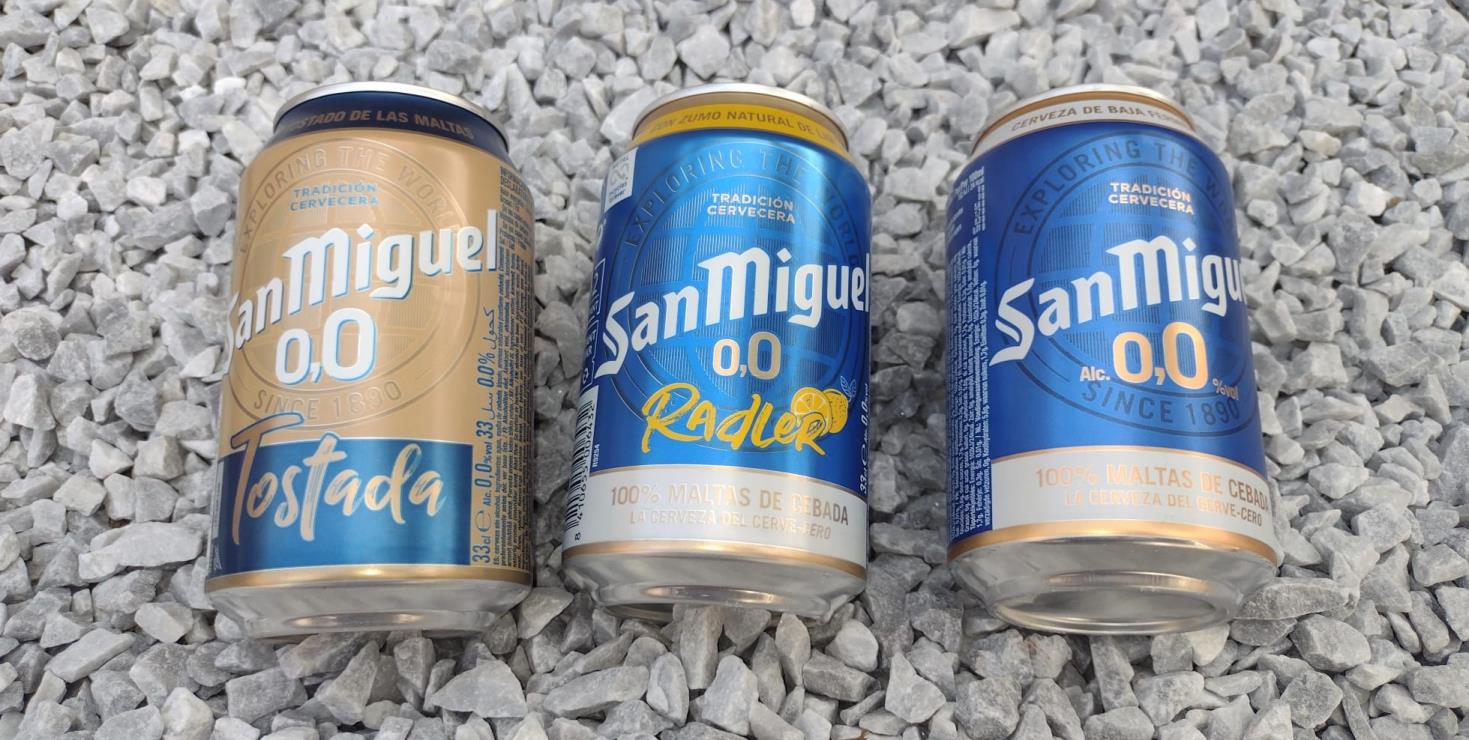
San Miguel 0.0 beers - tostada, radler and lager
FAQ – Non-alcoholic beers and triathletes
Are non-alcoholic beers suitable for athletes?
Absolutely! Non-alcoholic beers can be a great choice for athletes. They offer various benefits that can support their training and overall performance.
What are the main benefits of non-alcoholic beers for athletes?
There are several benefits worth mentioning:
- Hydration: Non-alcoholic beers are primarily composed of water, making them an excellent option for rehydrating athletes after intense workouts. They contain electrolytes like potassium and magnesium, which aid in replenishing lost minerals.
- Muscle recovery: Non-alcoholic beers often contain carbohydrates, which are essential for replenishing glycogen stores after exercise. Additionally, they may contain protein, which helps repair and rebuild muscles.
- Vitamin and mineral content: Some non-alcoholic beers are enriched with vitamins and minerals, such as B vitamins and antioxidants, which contribute to overall health and performance.
- Psychological relaxation: Enjoying a non-alcoholic beer can provide a mental break for athletes, allowing them to unwind and destress after rigorous training sessions.
Are non-alcoholic beers calorie-free?
Non-alcoholic beers do contain calories, but generally at a lower level than their alcoholic counterparts. The exact calorie content can vary depending on the brand and type of non-alcoholic beer.
Can non-alcoholic beers improve athletic performance?
While non-alcoholic beers can contribute to hydration, muscle recovery, and overall well-being, it's important to note that they won't directly enhance athletic performance. Optimal performance relies on factors such as training, nutrition, and rest.
Can non-alcoholic beers be consumed during exercise?
It's generally not recommended to consume non-alcoholic beers during exercise as they may lead to gastrointestinal discomfort. Instead, water and sports drinks are better choices for maintaining hydration during physical activity.
Are there any potential drawbacks to consuming non-alcoholic beers as an athlete?
Although non-alcoholic beers offer benefits, they should still be consumed in moderation. They may contain small amounts of alcohol (less than 0.5% ABV), so athletes should be cautious if they adhere to strict zero-alcohol policies. Additionally, non-alcoholic beers can still contribute to calorie intake, so athletes should consider their overall dietary goals and needs.
Remember, it's always best to consult with a nutritionist or sports dietitian to determine the most appropriate choices for your specific training and nutritional requirements.
